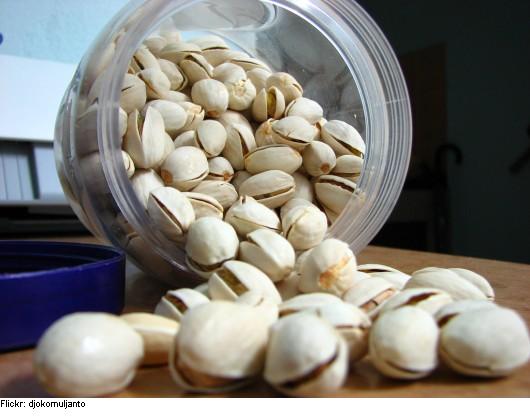It’s like a bad Lifetime special movie event:
Randall Rahal, a New Jersey businessman who acted as a broker for SK Foods in peddling crappy tomato paste, recounted how he would drop a $100 bill on the floor, then bend to  pick it up, saying: “You must have dropped this. Is it yours?”
pick it up, saying: “You must have dropped this. Is it yours?”
If the person said yes, Mr. Rahal considered him receptive.
For all the talk of food safety, food is still a commodity that can be traded and bartered with no concern for microbiological consequences, and apparently on the bend-and-snap.
And a lot of the culprits seem housed in the biggest food companies.
As the N.Y. Times reports this morning, Robert Watson, a top ingredient buyer for Kraft Foods, needed $20,000 to pay his taxes. So he called a broker for a California tomato processor that for years had been paying him bribes to get its products into Kraft’s plants.
The check would soon be in the mail, the broker promised. “We’ll have to deduct it out of your commissions as we move forward,” he said, using a euphemism for bribes.
Days later, federal agents descended on Kraft’s offices near Chicago and confronted Mr. Watson. He admitted his role in a bribery scheme that has laid bare a startling vein of corruption in the food industry. And because the scheme also involved millions of pounds of tomato products with high levels of mold or other defects, the case has raised serious questions about how well food manufacturers safeguard the quality of their ingredients.
Over the last 14 months, Mr. Watson and three other purchasing managers, at Frito-Lay, Safeway and B&G Foods, have pleaded guilty to taking bribes. Five people connected to one of the nation’s largest tomato processors, SK Foods, have also admitted taking part in the scheme.
 Now, federal prosecutors in California have taken aim at the owner of SK Foods, who they say spearheaded the far-reaching plot. The man, Frederick Scott Salyer, was arrested at Kennedy Airport in New York City on Feb. 4 after getting off a flight from Switzerland. He was indicted last week on racketeering, fraud and obstruction of justice charges.
Now, federal prosecutors in California have taken aim at the owner of SK Foods, who they say spearheaded the far-reaching plot. The man, Frederick Scott Salyer, was arrested at Kennedy Airport in New York City on Feb. 4 after getting off a flight from Switzerland. He was indicted last week on racketeering, fraud and obstruction of justice charges.
The scheme, as laid out by federal prosecutors, has two parts. Officials say that Mr. Salyer and others at SK Foods greased the palms of a handful of corporate buyers in exchange for lucrative contracts and confidential information on bids submitted by competitors. This most likely drove up ingredient prices for the big food companies.
In addition, prosecutors say that for years, SK Foods shipped its customers millions of pounds of bulk tomato paste and puree that fell short of basic quality standards — with falsified documentation to mask the problems. Often that meant mold counts so high the sale should have been prohibited under federal law; at other times it involved breaching specifications in the sales contracts, such as acidity levels or the age of the product.
The scope of the tainted shipments was much broader than the bribery scheme, touching more than 55 companies. In some cases, companies detected problems and sent the products back — but in many cases, according to prosecutors, they did not, and the tainted ingredients wound up in food sold to consumers.
Prosecutors said that no one was sickened by the mold-tainted products and that they were not a health risk.
But it gets back to a key point I keep reiterating – companies that rely on outside auditors do themselves a disservice – and put their brand at risk – if they don’t have the in-house food safety expertise to assess whether they’re being fed nonsense or not.
Mold count is fairly basic with tomatoes.
 Randy W. Worobo, an associate professor of food microbiology at Cornell University, said companies should learn from the SK Foods case that they must do a better job of monitoring their ingredients.
Randy W. Worobo, an associate professor of food microbiology at Cornell University, said companies should learn from the SK Foods case that they must do a better job of monitoring their ingredients.
“There’s been a lot of hype about inferior-quality products being made in China and then sold to the U.S. consumer. This is exactly the same thing, but it’s based in the U.S.”
Kraft, the nation’s largest food manufacturer, appears to have been among the biggest companies skimmed by the bribes. Court papers say that Kraft bought about 230 million pounds of processed tomatoes from SK Foods from 2004 to 2008, as Mr. Watson took $158,000 in bribes.
Michael P. Doyle, the director of the Center for Food Safety at the University of Georgia, said there had been several cases in recent years in which ingredient suppliers were suspected of falsifying documentation to mask quality or safety faults in foods, especially with imports. He said that should make companies more aggressive in testing, not only to guard against pathogens but also to check quality.
“As a consumer I wouldn’t want to have moldy tomatoes in my tomato ketchup or my tomato products,” Dr. Doyle said.
 Kraft has received eight consumer contacts about this product from the impacted line within this range of code dates and no injuries have been reported. We deeply regret this situation and apologize to any consumers we have disappointed.
Kraft has received eight consumer contacts about this product from the impacted line within this range of code dates and no injuries have been reported. We deeply regret this situation and apologize to any consumers we have disappointed.
 pick it up, saying: “You must have dropped this. Is it yours?”
pick it up, saying: “You must have dropped this. Is it yours?”  Vegemite is made from leftover brewers’ yeast extract
Vegemite is made from leftover brewers’ yeast extract This raises many questions. Chief among them is how very terrible were the other 47,999 competition submissions that Kraft was left with iSnack 2.0?
This raises many questions. Chief among them is how very terrible were the other 47,999 competition submissions that Kraft was left with iSnack 2.0? Workers at one of Kraft’s manufacturers in Illinois turned up a contaminated batch of fruits and nuts in December 2007. Then, in September of last year, another positive sample appeared.
Workers at one of Kraft’s manufacturers in Illinois turned up a contaminated batch of fruits and nuts in December 2007. Then, in September of last year, another positive sample appeared. The press release from the
The press release from the